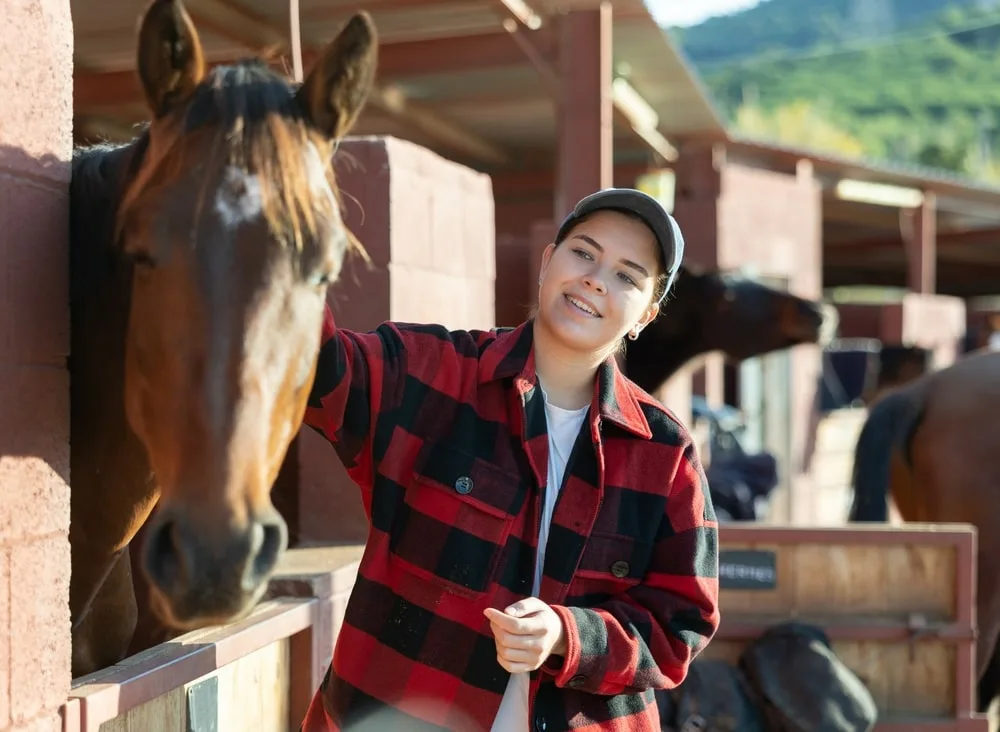There’s so much labour required to make the cogs spin smoothly in the horse racing industry and various roles to fill within it. Whether you’re aspiring to a role in the field or just a fan interested in the work behind the scenes, here’s a rundown of some of the primary jobs you find around the racecourse.
Racing Groom
The racing groom is the unsung hero of horse racing. These are the people who physically look after the horses, keeping them well-fed, hydrated, clean and healthy. Grooms also maintain the stables, mucking stalls and keeping equipment like saddles in working order. It’s hard work with a lot of physical labour and variable hours, especially during racing season.
The position of racing groom tends to be a rung on the ladder of equine employment, and the pay reflects this, averaging about £12k – £18k a year, but this fluctuates with age and experience. Racing grooms don’t require any qualifications, and many positions offer training to employees. However, most people enter the industry by helping at stables throughout their childhood, climbing their way up from there, or entering into apprenticeships.
Jockey
The jockey is the most visible worker at the races as they’re in the spotlight alongside the horses. Professional jockeys are highly trained athletes who dedicate themselves to the sport of horse racing, training their bodies, developing their racing skills and working on winning strategies. A jockey’s workday can be long and demanding, with a surprisingly small amount of it spent actually riding horses.
Horse riding is a highly competitive industry, and getting your foot in the door can be expensive. Aspiring riders can enter the industry in several ways, such as apprenticeships, specialist riding schools or working their way up through stable work. Whichever way they enter the field, all jockeys require excellent riding skills and talent to be successful.
Being a jockey is a difficult job and is only lucrative for those at the very top of the field. Riding fees are fixed regardless of who the jockey is at £157.50 for flat races and £214.63 for jumps; as a result, the most successful jockeys are the ones that take more races. Jockeys also make a portion of the prize money, around 6-9%, depending on the type of race. However, most of any money they make would come from sponsorships, which are reserved for the top of the pack.
Trainer
Of all these positions, racehorse trainer is the most exclusive, with only about 600 licenced trainers in the UK today. As you can guess, horse trainers are the people who mould horses into the athletic stars we see on the track. They oversee and manage the horse’s training, diet, grooming and healthcare, and trainers work with multiple horses simultaneously. Trainers will communicate with owners to coordinate schedules and proper care, and many trainers own horses themselves.
Horse trainers do more than just train the horses; they usually own and manage stables and yards. Thanks to this, horse training is an expensive job to get involved with and tends to be the type of profession passed onto an apprentice or family member. However, it’s also incredibly lucrative. Trainers make most of their money through prize cuts, so it’s hard to estimate their yearly earnings, but with a dozen or more horses under their umbrella, you have to imagine it adds up quickly.
Racecourse Manager
You’ll find many different managers at racecourses, all responsible for various aspects of the racecourse, whether it’s marketing, organising events or catering. Managing a racecourse is much like running any other business, with many tasks that need constant oversight and distribution, staff to direct, and outside contracts to negotiate, not to mention maintaining their relationships with horse owners, trainers and jockeys.
Racecourse managers can reach their positions directly or through upward mobility. An aspiring racecourse manager would benefit from a related qualification like business or marketing like any other manager. As you would expect, managerial positions are secure and well-paid, with salaries ranging from £30k – £60k a year depending on authority and the prestige of the racecourse.
Racing Journalist
Like all other sports, there’s a niche in the papers for horse racing where writers find news and share opinions and expertise to keep fans up-to-date and informed. Racing journalists might work in the sports section of a larger paper, or they could write for horse racing specialist newsletters.
Racing journalists are like most other journalists and are employed similarly. They could be employed by a specific paper or work freelance, and some of the most successful individuals may also work in television. The average salary for employed journalists is from £25k – £30k per annum, but a freelance journalist could make less or more.
Horse Racing Syndicator
If you’ve ever looked into horse ownership, you might have encountered organisations called Horse Racing Syndicates. These groups collectively own a racing horse to keep the cost down; this can be as few as five people to as many as four thousand. These groups are managed by a syndicator, who is the person or company that owns the horse in writing and maintains its care and training.
A syndicator has to purchase and care for the horse in the stead of its many owners. An aspiring syndicator requires no qualifications, just the money to get started and maintain the horse. However, experience in management or marketing would be a considerable advantage for managing the syndicate members and advertising to find new buyers. Syndicators make variable money depending on how much they sell shares for and how much of a cut they take from prize winnings.
Other Job Roles
While we’ve detailed some of the most high-profile and best-known roles around a racecourse, it takes a village to raise a child — or a horse, in this case — so this is hardly the end of the list. We’ve collected a few of the other roles found around the track for you to look further into yourself:
- Stud hand
- Full-time riders
- Yard staff
- Hospitality staff
- Greenkeeper
- Legal advisors
- Riding teacher
- Stable staff
- Vet
Conclusion
If you’re interested in working with horse racing, there are plenty of angles to do so, whether hands-on with the horses or writing about them from behind a desk. It’s never too late to do something new with your life and chase the experiences that make you happy.
But, if you’re looking for a way to get involved that isn’t quite as life-altering, consider purchasing a share in a racing horse syndicate. Involve yourself with racing as an owner, indulging in all the perks like visiting your horse and attending its races without worrying about the labour that goes with it.
Ready to become a Horse Owner?
You’re just a few clicks away from starting this exciting adventure with RC Syndicates!
Buy a Share





